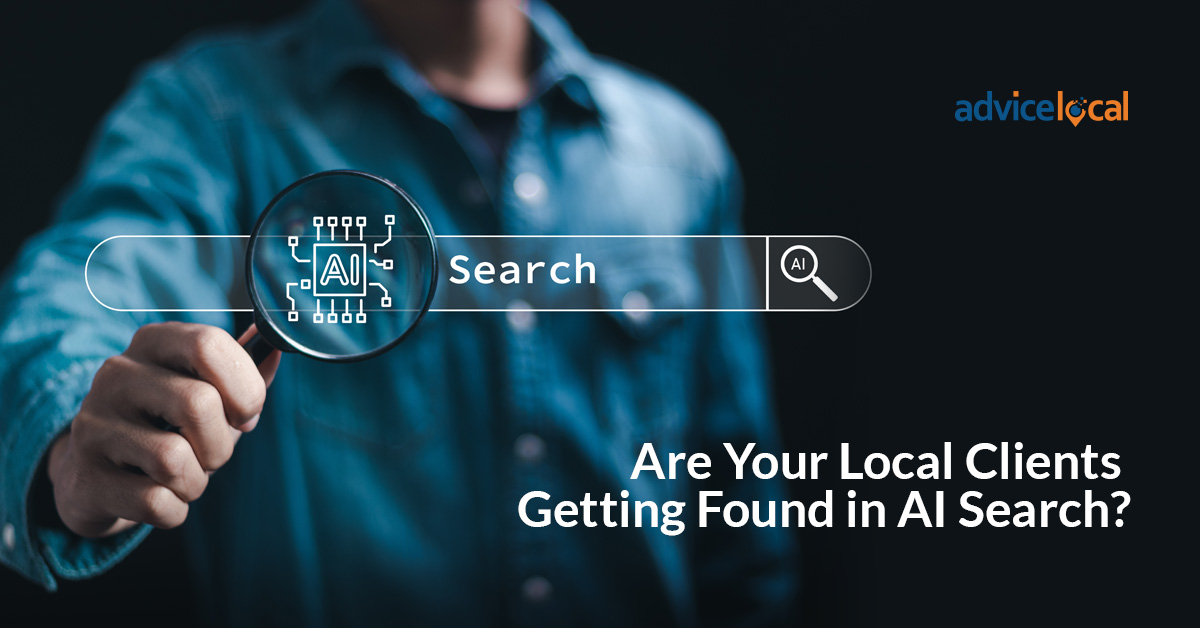The need for citations has evolved alongside technology, and AI-powered local search readiness is here to stay. As search continues to change, there’s one thing that remains the same—and that’s the need for high-quality citation services.
Just a few short years ago, optimizing for mobile was at the center of local search, quickly followed by voice search preparedness. Today, a business must be optimized for Google Maps, organic search, voice search, mobile search and now AI search.
Why Is AI Search Important for Local Search Clients?
AI is everywhere right now—yes, even in local search. The first popular Generative Pre-Trained Transformer (GPT) seemed to be simply another way to find answers to questions online. However, in a short span of time, GPT and other large language models (LLMs) have become so much more. Consumers can use AI to write their grocery lists after searching for the nearest local store, or use it to plan a future vacation, with excursions to renowned sites included. These are a couple of examples why ongoing management of your clients’ business listings is necessary.
Currently, the largest search engines have incorporated AI into their proprietary web browsers, while other companies use these major search engines to power the data returned in their AI-powered searches.
The Biggest AI-Powered Search Solutions
These AI-powered search solutions (also known as AE’s or answer engines) are changing the way that consumers search for your local business clients online, as well as changing the answers they get when they do search. And in fact, you’re probably already aware of the following answer engines.
- Gemini was developed by Google. It is integrated into their Chrome web browser and many of their other properties, including the Assistant and Maps.
- ChatGPT was originally developed by the company OpenAI, but purchased by Microsoft (and is now integrated into Bing). This answer engine’s search component, ChatGPT Search, is powered by Bing.
- CoPilot is Microsoft’s AE and part of their web browser, Microsoft Edge. It’s incorporated into Bing and their other imprints as well.
- Perplexity AI is another company that provides a GPT-based answer engine that also uses Bing as the source for its search engine.
- Grok is part of the social networking site X (formerly Twitter). It is integrated into the platform but also available on its own website, and is being tested as a standalone mobile app in countries abroad. It’s powered and developed by the company xAI.
While Bing is the base search engine for three of the five answer engines listed, Google Search still dominates. As of 2022, 87% of consumers used Google to evaluate local businesses (according to a 2023 Bright Local survey). This is up from 81% in 2021. With all the new answer engines, their rapid growth and adoption, it’s important to keep clients’ data prepared and readily accessible to AI robots, LLMs, GPTs and more. But how?
How Are AI-Powered Local Search Results Determined?
AI-powered search is still developing, and it’s moving rapidly. To keep up, local marketers and agency partners need to optimize client websites, Google Business Profiles (GBP), and other assets to be found in AI-powered local search. So far, we’ve learned that the search results pushed to the top of these queries are determined based on brand trust, citations, reviews, structured data and localized content.
Brand Trust
Consumers want relevant answers quickly, and AI-powered search prioritizes brands with a high level of trust or authority. This is where following Google’s Experience, Expertise, Authoritativeness and Trustworthiness (EEAT) guidelines for all the online content of a business is important. Partners using Advice Local’s listings management services can see a client’s authority score in their partner dashboard.
Citations
Consistent, organized data across platforms is vital to the online success of any business. This is exponentially true for AI-powered search results. Distribution of these citations to vast and varied networks is the next step. Advice Local’s data amplifier network handles this, distributing client data to multiple trusted data aggregators. AI robots search these types of data sources for answers, making them very important to local search clients.
Reviews
In a way, reviews add the human touch to AI search. Sentiment is conveyed via star-ratings and written text. On Google, reviews show up as part of AI Overviews and in the Map Pack. It’s always a best practice for businesses to encourage new reviews, and for them to manage and respond to reviews, both positive and negative. This engagement is seen by search engines and picked up by AI models. With reviews being as important as they are, we make it easy for you to monitor reviews on the most popular review sites within your partner dashboard. You can also set up automated reporting to be sent to your clients.
Structured Data
Clean, consistent schema markup makes it easier for search engines, AI robots and LLMs to glean sites for relevant answers. Update this data as needed during site audits and content refreshes, and make it part of the process to be checked whenever a new piece of content is published on one of your client’s websites. Ensure that client sites are able to be read by robots for a chance to show up in AI search results, like AI Overviews or the products listed above.
Localized Content
As you know, hyperlocal content is a big part of local SEO. Consistently posting relevant updates to websites, GBPs and the like keeps content fresh, and increases the opportunity of being featured highly in search results, AI or otherwise.
Even in the fast pace of this emergent AI-powered technology, foundational local search best practices still reign supreme.
Get Your Agency Clients Found in AI Search and Much More
Get clients optimized and prepared for AI-powered local search with clean, updated citations, award-winning listings management, and Advice Local’s vast data amplifier network. Request a demo today, or call (214) 310-1356 to learn more.




